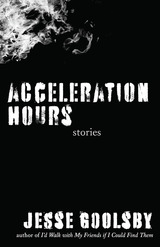
2020 Foreword INDIE awards, longlist
From the author of the critically-acclaimed novel, I’d Walk with My Friends If I Could Find Them, Jesse Goolsby’s Acceleration Hours is a haunting collection of narratives about families, life, and loss during America’s twenty-first-century forever wars. Set across the mountain west of the United States, these fierce, original, and compelling stories illuminate the personal search for human connection and intimacy. From a stepfather’s grief to an AWOL soldier and her journey of reconciliation to a meditation on children, violence, and hope, Acceleration Hours is an intense and necessary portrayal of the many voices living in a time of perpetual war.
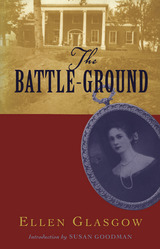
Captures the war's human toll and explores its social consequences
The Battle-Ground, Ellen Glasgow's fourth novel, was her first bestseller, with more than 21,000 copies sold in just two weeks. The novel committed her to a project almost unparalleled in American literary history: a novelistic meditation on the South from the decade before the Confederacy to the middle of the 20th century. The Battle-Ground speaks of a South before and during the Civil War in its struggles to become part of a nation still in the making. The overthrow of the aristocratic tradition, the transfer of hereditary power to a rural underclass, the continued disenfranchisement of African Americans, and the evolving status of women--these topics, which came to bind the more than a dozen volumes of Glasgow's self-styled "social history," initially coalesced in The Battle-Ground.
The Battle-Ground conspicuously departs from the tradition of Southern romances popularized by Thomas Nelson Page, and contemporary reviewers praised the book for its historical accuracy. Glasgow, an ardent Anglophile, bragged that military officers in Great Britain studied its descriptions of battle. With her, realism had not only crossed the Atlantic, it had "crossed the Potomac."
But Glasgow never sensationalizes the Civil War, whose bloodiest scenes she flanks with domestic officers, the sharing of rations, the warmth of camp, and reminders of home. Her vision of the war centers less on its corruption or barbarity than on its occasions for small decencies and their power of humanization. Glasgow cannot separate the war from its greater social implications--it is a place, as her title suggests, that tests the soul of a nation as well as individual men and women. The importance of The Battle-Ground in Southern literary history cannot be overemphasized, for Glasgow's reimagining of the Civil War had a profound impact on the next generation of Southern writers, including Allen Tate, Stark Young, and Margaret Mitchell.

A mystery linking Manhattan circa 1991 to eastern Afghanistan in 2012, Blue Hours tells of a life-changing friendship between two memorable heroines. When we first meet Mim, she is a recent college graduate who has disavowed her lower middle class roots to befriend Kyra, a dancer and daughter of privilege, until calamity causes their estrangement. Twenty years later, Kyra has gone missing from her NGO’s headquarters in Jalalabad, and Mim—now a recluse in rural New England—embarks on a journey to find her. In its nuance, originality, and moral complexity, Blue Hours becomes an unexpected page-turner.

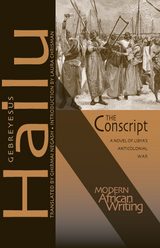
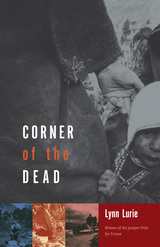
"I use the camera to block my view," says Lisette. This is the start of her double vision—trying to forget and trying to recall—and her struggle to come to terms with the human capacity for cruelty. But the grim reality in Peru is so overpowering that she carries it with her back to New York and through the rest of her life. Having abandoned a lover along with the fight, she desperately tries to find meaning beyond that of mere survival.
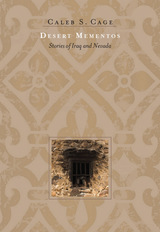
Cage captures similarities in the respective desert landscapes of both Iraq and Nevada, but it is not just a study in contrasting landscapes. The inter-connected stories explore similarities and differences in human needs from the perspectives of vastly different cultures. Specifically, the stories deftly capture the overlap in the respective desert landscapes of each region, the contrasting cultures and worldviews, and the common need for hope. Taken together, the stories represent the arc of a year-long deployment by young soldiers. Cage’s stories are bound together by the soldier’s searing experiences in the desert, bookended by leaving and returning home to Nevada, which in many ways can be just as disorienting as patrolling the Iraq desert.
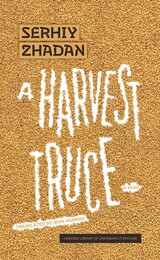
Brothers Anton and Tolik reunite at their family home to bury their recently deceased mother. An otherwise natural ritual unfolds under extraordinary circumstances: their house is on the front line of a war ignited by Russian-backed separatists in eastern Ukraine. Isolated without power or running water, the brothers’ best hope for success and survival lies in the declared cease fire—the harvest truce. But such hopes are swiftly dashed, as it becomes apparent that the conflagration of war will not abate.
With echoes of Waiting for Godot, Serhiy Zhadan’s A Harvest Truce stages a tragicomedy in which the commonplace experiences of death, birth, and the cycles of life marked by the practices of growing and harvesting food are rendered futile and farcical in the wake of the indifferent juggernaut of war.
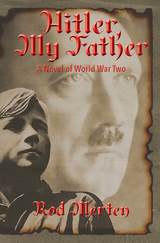
An adoring young woman encounters Adolph Hitler when her youth group sings for him. He demands her company in private, and she becomes pregnant, bearing his child but never being contacted by Hitler again. The plot follows her life as an outcast believed to be lying about the child’s parentage, and the life of her son told through her correspondence, diary entries, and from the point of view of a researcher who writes a generation later. Based on facts and documented history, author Ron Merten tells this tale with just enough creativity to make the story fascinating.
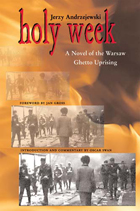
At the height of the Nazi extermination campaign in the Warsaw Ghetto, a young Jewish woman, Irena, seeks the protection of her former lover, a young architect, Jan Malecki. By taking her in, he puts his own life and the safety of his family at risk. Over a four-day period, Tuesday through Friday of Holy Week 1943, as Irena becomes increasingly traumatized by her situation, Malecki questions his decision to shelter Irena in the apartment where Malecki, his pregnant wife, and his younger brother reside. Added to his dilemma is the broader context of Poles’ attitudes toward the “Jewish question” and the plight of the Jews locked in the ghetto during the final moments of its existence.
Few fictional works dealing with the war have been written so close in time to the events that inspired them. No other Polish novel treats the range of Polish attitudes toward the Jews with such unflinching honesty.
Jerzy Andrzejewski’s Holy Week (Wielki Tydzien, 1945), one of the significant literary works to be published immediately following the Second World War, now appears in English for the first time.
This translation of Andrzejewski’s Holy Week began as a group project in an advanced Polish language course at the University of Pittsburgh. Class members Daniel M. Pennell, Anna M. Poukish, and Matthew J. Russin contributed to the translation; the instructor, Oscar E. Swan, was responsible for the overall accuracy and stylistic unity of the translation as well as for the biographical and critical notes and essays.

In “Prayers of an American Wife,” a Navy wife grapples with loneliness when she discovers that her neighbor, also a Navy wife, is having an affair while their husbands are deployed on the same aircraft carrier. Tensions rise in “The Strangers of Dubai” as a soldier on leave tries to buy his wife a souvenir from an Afghan vendor. After attending eight funerals with fellow military wives whose husbands died in the Iraq war, the protagonist in “Finding the Good Light” divorces her Navy husband and tries to start a new life as a movie star. These, along with the eleven other stories in this collection, explore the emotional landscape of the resilient women who remain on the homefront.
Kelly’s stories offer readers an intimate, eye-opening look into the sacrifices and steadfastness of military family members.
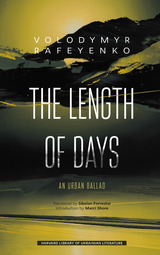
The Length of Days: An Urban Ballad is set mostly in the composite Donbas city of Z—an uncanny foretelling of what this letter has come to symbolize since February 24, 2022, when Russia launched a full-scale invasion of Ukraine. Several embedded narratives attributed to an alcoholic chemist-turned-massage therapist give insight into the funny, ironic, or tragic lives of people who remained in the occupied Donbas after Russia’s initial aggression in 2014.
With elements of magical realism, Volodymyr Rafeyenko’s novel combines a wicked sense of humor with political analysis, philosophy, poetry, and moral interrogation. Witty references to popular culture—Ukrainian and European—underline the international and transnational aspects of Ukrainian literature. The novel ends on the hopeful note that even death cannot have the final word: the resilient inhabitants of Z grow in power through reincarnation.
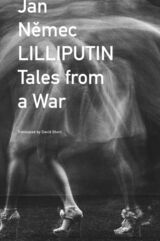
A Czech man in Ukraine in search of his alter ego. A gang of homeless kids driven from a cellar by tenants using it as a shelter from the war. A German couple who ‘rented a womb’ in Ukraine, whose child is now stuck in Kyiv. A teenager partnered with a Valkyrie for the distribution of lavash in besieged Mariupol delays his flight until it is too late. A Russian academic mounting a protest in the center of Moscow dressed in a costume from Swan Lake. They may not be soldiers at the front, but for the characters in these stories, life will never again be as it was before the Russian invasion of Ukraine. In this collection of short stories—two set in Ukraine, two in the West, and one in Russia—Czech author Jan Nemec has produced a work of remarkable immediacy.
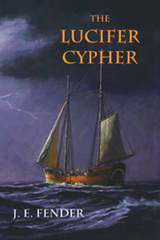
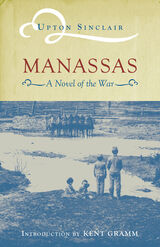
Allan Montague, born on a Mississippi plantation about twenty years before the Civil War, has grown up with slavery and considers it natural. When his father moves to Boston for business and takes the boy with him, young Allan carries a knife given to him by his cousin to use in killing abolitionists.
The first abolitionist young Allan meets in Boston is Levi Coffin, the reputed founder of the Underground Railroad. In this first of many meetings with historical figures, Allan forms a friendship with Coffin, who eventually takes him to hear a speech by former slave Frederick Douglass. Douglass's powerful words cement Allan's transformation into an abolitionist—a transformation that will lead him back to his Deep South home with the hope of freeing slaves and eventually back to the North and the fateful Battle of Manassas.
Kent Gramm, author of the introduction for this new edition of Manassas, calls the novel “a modern version of the morality play,” with the United States as the central character. “The real story, he writes, is the moral phenomenon of the Civil War.” It is a powerful book that deserves to be revived, read, and studied.
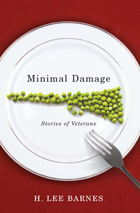
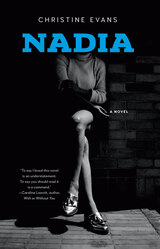
Nadia moves between the competing perspectives of two survivors of the 1990s Balkan Wars who have escaped to London, only to discover that the war has followed them there. Nadia is a young refugee who just wants to forget the past—until Iggy starts temping at her London office. Afraid he may be a sniper from the war she fled, Nadia starts seeing threats everywhere, alongside unsettling visions of her lost girlfriend, Sanja. As her volatile connection with Iggy unravels, Nadia is forced to face the ethically shaky choices she made to escape the war, her survivor guilt, and her disavowed queer sexuality.
Christine Evans's novel takes us to the recent past of a war that broke apart a European country and that presciently foreshadowed the rise of ethno-nationalism in the West. Tense, suspenseful, and mordantly funny, Nadia tracks the complex ways in which a past marked by political violence can shadow and disrupt the present.
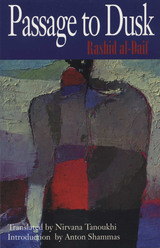
Passage to Dusk deals with the Lebanese civil war of the 1970s in a postmodern, poetic style. The narrative focuses on the deranged, destabilized, confused, and hyper-perceptive state of mind created by living on the scene through a lengthy war. The story is filled with details that transcend the willed narcissism of the main character, while giving clues to the culture of the time. It is excellent fiction, written in a surrealistic mode, but faithful to the characters of the people of Lebanon, their behavior during the war, and their contradictions. Issues of gender and identity are acutely portrayed against Lebanon's shifting national landscape.
The English-language reader has not been much exposed to Lebanese literature in translation, and Rashid al-Daif is one of Lebanon's leading writers. He has been translated into eight languages, including French, German, Italian, Polish, and Spanish. Translator Nirvana Tanoukhi manages to preserve Daif's unusual, moving, and at times humorous style in her English rendition.
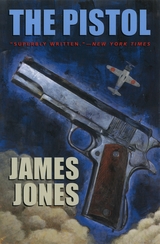
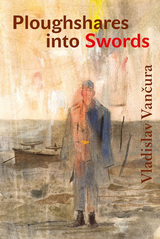
Originally published in 1925, Ploughshares into Swords is an expressionist antiwar novel in which Vladislav Vančura tells the story of the denizens of the Ouhrov estate in language as baroque as the manor that ties them all together. The fragmented narrative introduces the reader to such characters as Baron Danowitz, his sons, his French concubine, the farmhand František Hora, and the mentally disabled murderer Řeka in the autumn of 1913, before revealing their fates during World War I. Ranging from the peaceful farmlands of Bohemia to the battlefields of Galicia, taking in the pubs of Budapest and the hospitals of Krakow, the novel constitutes an unsentimental and naturalistic approach to the war that created Czechoslovakia. Ploughshares into Swords is a stunning novel by one of Czech literature’s most important writers. This modernist masterpiece, reminiscent of the work of Isaac Babel and William Faulkner, is now available in English for the very first time.
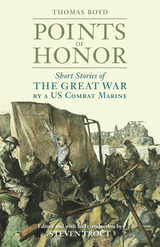
Points of Honor: Short Stories of the Great War by a US Combat Marine is based on author Thomas Alexander Boyd’s personal experiences as an enlisted Marine. First published in 1925 and long out of print, this edition rescues from obscurity a vivid, kaleidoscopic vision of American soldiers, US Marines mostly, serving in a global conflict a century ago. It is a true forgotten masterpiece of World War I literature.
The stories in Points of Honor deal almost entirely with Marines in the midst of battle—or faced with the consequences of military violence. The eleven stories in this collection offer a panoramic view of war experience and its aftermath, what Boyd described as “a mass of more human happenings.” The themes are often antiheroic: dehumanization, pettiness, betrayal by loved ones at home, and the cruelty of military justice. But Boyd’s vision also accommodates courage and loyalty. Like all great works of war literature, this collection underscores the central paradox of armed conflict—its ability to bring out both the best and worst in human beings.
This reissue of Points of Honor is edited, annotated, and introduced by Steven Trout. Trout provides an overview of Thomas Boyd’s war experience and writing career and situates the stories within the broader context of World War I American literature.
Points of Honor received strong reviews at the time of its initial publication and remains an overwhelming reading experience today. While each of the stories is a freestanding work of art, when read together they carry the force of a novel.
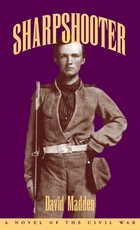
A gripping and thought-provoking work that is unlike any Civil War novel previously written, Sharpshooter takes us into the mind of one of the war’s veterans as he attempts, years after the conflict, to reconstruct his experiences and to find some measure of meaning in them.
A child of the divided East Tennessee mountain region, Willis Carr left home at age thirteen to follow his father and brothers on a bridge-burning mission for the Union cause. Imprisoned at Knoxville, he agreed to join the Confederate army to avoid being hanged and became a sharpshooter serving under General Longstreet. He survived several major battles, including Gettysburg, and eventually found himself guarding prisoners at the infamous Andersonville stockade, where a former slave taught him to read.
After the war, haunted by his memories, Carr writes down his story, revisits the battlefields, studies photographs and drawings, listens to other veterans as they tell their stories, and pores over memoirs and other books. Above all, he embues whatever he hears, sees, and reads with his emotions, his imagination, and his intellect. Yet, even as an old man nearing death, he still feels that he has somehow missed the war, that something essential about it has eluded him. Finally, in a searing moment of personal revelation, a particular memory, long suppressed, rises to the surface of Carr’s consciousness and draws his long quest to a poignant close.
A compelling work of fiction from a writer who is both a gifted novelist and a distinguished student of the Civil War, David Madden’s Sharpshooter invites us to see this signal episode in American history in a new way—to grasp its facts, to imagine what facts cannot convey, and to make the war our own.
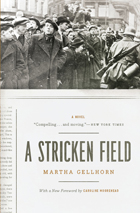
Martha Gellhorn was one of the first—and most widely read—female war correspondents of the twentieth century. She is best known for her fearless reporting in Europe before and during WWII and for her brief marriage to Ernest Hemingway, but she was also an acclaimed novelist.
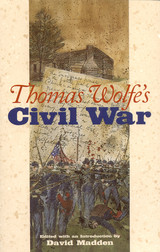
An anthology of Thomas Wolfe’s short stories, novel excerpts, and plays illuminating the Civil War
This collection of Thomas Wolfe’s writings demonstrates the centrality of the Civil War to Wolfe’s literary concerns and identity. From Look Homeward, Angel to The Hill Beyond and The Web and the Rock, Wolfe perpetually returned to the themes of loss, dissolution, sorrow, and romance engendered in the minds of many southerners by the Civil War and its lingering aftermath. His characters reflect time and again on Civil War heroes and dwell on ghostlike memories handed down by their mothers, fathers, and grandfathers. Wolfe and his protagonists compare their contemporary southern landscape to visions they have conjured of its appearance before and during the war, thereby merging the past with the present in an intense way. Ultimately, Wolfe’s prose style—incantatory and rhapsodic—is designed to evoke the national tragedy on an emotional level.
Selections of Wolfe’s writings in this collection include short stories ("Chickamauga," "Four Lost Men," "The Plumed Knight"), excerpts from his novels (O Lost, the restored version of Look Homeward, Angel, The Hills Beyond, and Of Time and the River) and a play, Mannerhouse, edited and introduced by David Madden. Madden, who makes the provocative claim that everything a southern writer writes derives from the Civil War experience, also highlights many issues essential to understanding Wolfe’s absorption with the Civil War.
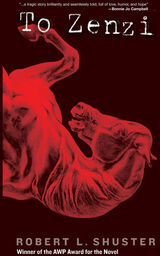
Shuttling between the insanity of the Führer’s bunker and the chaotic streets, Tobias must contend with a scheming Martin Bormann, a deceitful deserter, the Russian onslaught, and his own compounding despair—all while falling for Zenzi, a girl of Jewish descent (a mischling) who relays secret news of death camps and convinces Tobias to make a treacherous escape to the Americans.
With thrilling risks in plotting and prose, with moments of pathos and absurdity, Shuster richly conjures a mad, tragic world.
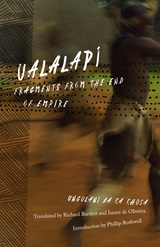

In Ukraine, War, Love, Olena Stiazhkina depicts day-to-day developments in and around her beloved hometown Donetsk during Russia’s 2014 invasion and occupation of the Ukrainian city. An award-winning fiction writer, Stiazhkina chronicles an increasingly harrowing series of events with sarcasm, anger, humor, and love.
The diary opens on March 2, 2014, as the first wave of pro-Russian protest washes over eastern Ukraine in the wake of Euromaidan, the Revolution of Dignity, and it closes on August 18, 2014, the day a convoy of civilian Ukrainian refugees is deliberately slaughtered by Russian forces. Early on, Stiazhkina is captured by pro-Russian forces while she browses for books but is freed when one of her captors turns out to be a former student. Vignettes from her personal life intermingle with current events, and she examines ordinary people in extraordinary circumstances. We walk with local dogs and their owners; we meet a formidable apartment building manager who shames occupiers and dismantles their artillery from the roof of her building; we follow a family evacuated to Kyiv whose young son builds checkpoints out of Legos. Olena Stiazhkina’s Ukraine, War, Love: A Donetsk Diary is a fierce love letter to her country, her city, and her people.
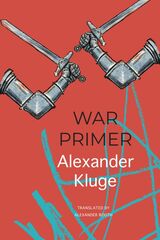
“War is back again.” So begins Alexander Kluge’s latest book, prompted by a war of aggression that, though being waged in Europe, is of global importance. Blending simple stories with multimedia and reflecting on human responses and hope, the author does not aim to take sides nor make an appeal. Rather, he is concerned with what he calls “mole war,” the tenacious and often subterranean survival of war—what war makes of people and what life of its own it is capable of.
Kluge’s book is based on an iconic model, the primer, and named after a famous one: Bertolt Brecht’s. Here we find simple stories underpinned with montages, film stills, and sequences. The author was ten years old when—sitting at his school desk and with his finger on the map—he followed German tanks on their journey to Stalingrad. In the time between then and his ninety-first birthday in February 2023, this chronicler of emotions has studied the costumes of war again and again: War is mortal but does not die quickly. How can we respond to its demands?

In the summer of 1863, Adam Rosenzweig leaves a Bavarian ghetto and sails for the United States to fight for the North in the Civil War. Fired by a revolutionary idealism inherited from his father, he hopes to aid a cause that he believes to be as simple as he knows it to be just.
Over the course of his journey, Adam becomes witness to a world whose complexity does not readily conform to his ideals of liberty. When his twisted foot attracts unwanted attention on his voyage to America, he is threatened with return to Europe. He jumps ship in New York, only to be caught up in the violence and horror of the anti-draft riots. Eventually he reaches the Union Army, serving not as a soldier but as a civilian provisioner’s assistant. Adam’s encounters with others—among them a wealthy benefactor, a former slave, an exiled Southerner, a bushwacker and his wife—further challenge the absolutism that informs his view of the world and of his place in it.
First published in 1961, Wilderness remains a profoundly provocative meditation on the significance of the Civil War and the varieties of human experience. This new edition of the novel includes an insightful introductory essay by James H. Justus, Distringuished Professor Emeritus at Indiana University and author of The Achievement of Robert Penn Warren.
The Author: Robert Penn Warren (1905–1989)was born in Kentucky and studied at Vanderbilt and Oxford Universities. As a novelist, teacher, poet, and critic, he became one of America’s most celebrated men of letters and the only writer to receive Pulitzer Prizes for both poetry and fiction. In addition to Wilderness, his novels included All the King’s Men, World Enough and Time, and Band of Angels.
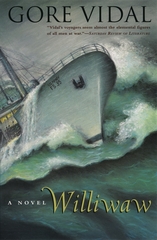
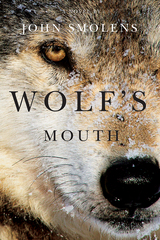
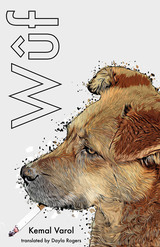
Told through the voice of a canine narrator, Wûf is a surrealist wartime love story set in Turkey in the 1990s. The novel follows Mikasa, a street dog who recounts a tale of tragic wartime love at a kennel where he finds solace in storytelling and cigarettes. A book that took the Turkish literary world by storm, Kemal Varol’s Wûf tackles universal themes of love and loss with both humor and pathos. Translated by PEN/Heim Award winner Dayla Rogers, the novel renders in English a one-of-a-kind love story with a narrator its readers won’t soon forget.
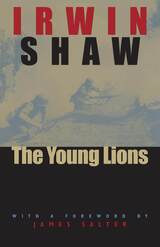
READERS
Browse our collection.
PUBLISHERS
See BiblioVault's publisher services.
STUDENT SERVICES
Files for college accessibility offices.
UChicago Accessibility Resources
home | accessibility | search | about | contact us
BiblioVault ® 2001 - 2024
The University of Chicago Press









